Latimer Road Elementary 24-25
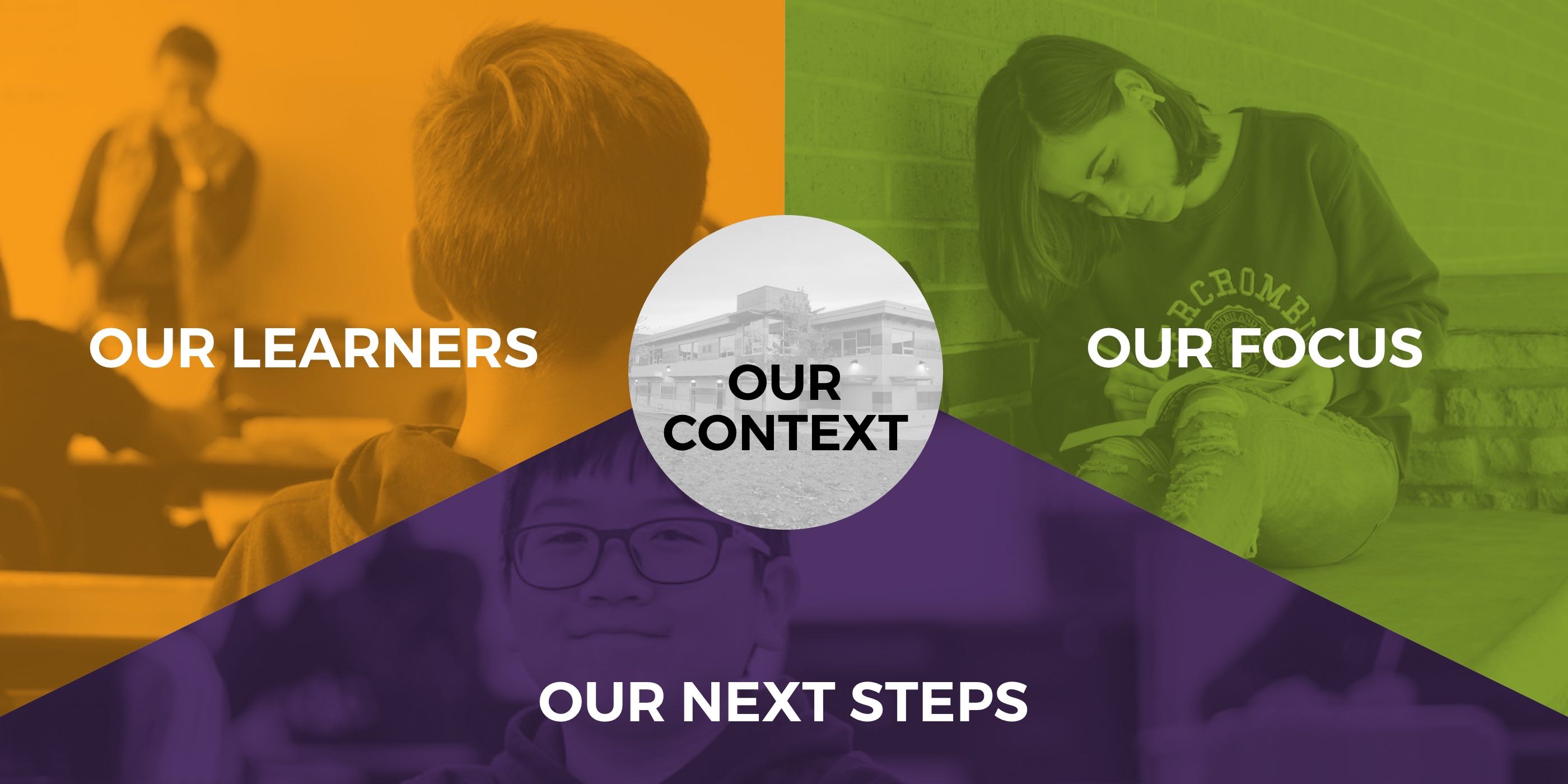

OUR CONTEXT
OUR LEARNERS
Literacy at Our School: Honouring Story, Identity, and Purposeful Communication
At our school, literacy is understood not only as a fundamental life skill, but as a means of nurturing identity, building community, and deepening understanding of self and others. Rooted in the First Peoples Principles of Learning, our approach to literacy recognizes that learning is holistic, reflexive, reflective, experiential, and relational. Through the English Language Arts curriculum, students develop the literacy and language skills they need to thrive in school, in their communities, and in life.
Literacy instruction offers learners the opportunity to become thoughtful communicators, capable of expressing their ideas clearly and listening with respect to the ideas of others. As students engage with a wide range of texts—oral, written, visual, and digital, they expand their perspectives and develop an understanding of both real and imagined experiences. This fosters deeper insight into who they are, their place in the world, and their responsibility to others.
Learning Through Connection, Story, and Relationship
Language and story are central to Indigenous ways of knowing, and we honour this by embedding storytelling, oral language development, and personal connection throughout our literacy program. Our students participate in informal and structured conversations where they listen, share, reflect, and learn from one another. These conversations build empathy, understanding, and a sense of belonging.
In our kindergarten classrooms, learners engage in daily sharing circles. Using prompts such as "On the weekend I...," they stretch out words, explore sounds, and develop phonemic awareness through storytelling. These experiences ground early writing in personal voice and oral tradition.
Intermediate students recently explored family legends, recognizing that stories connect generations and carry knowledge. With guidance, they interviewed parents or grandparents about a family or cultural legend, then shared these stories with their peers. This work not only built communication skills, but also deepened students' appreciation for identity, heritage, and the intergenerational nature of learning.
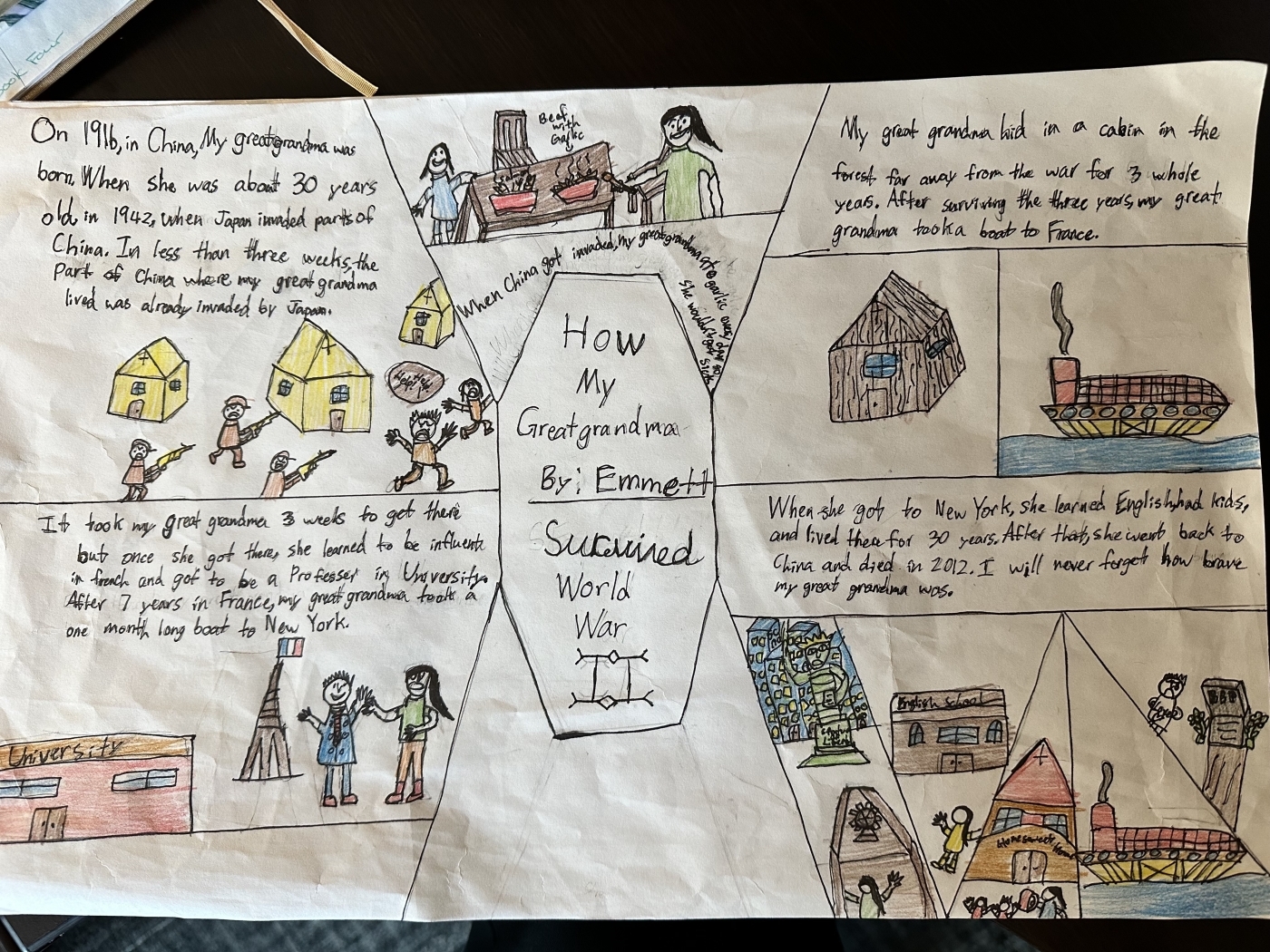 | 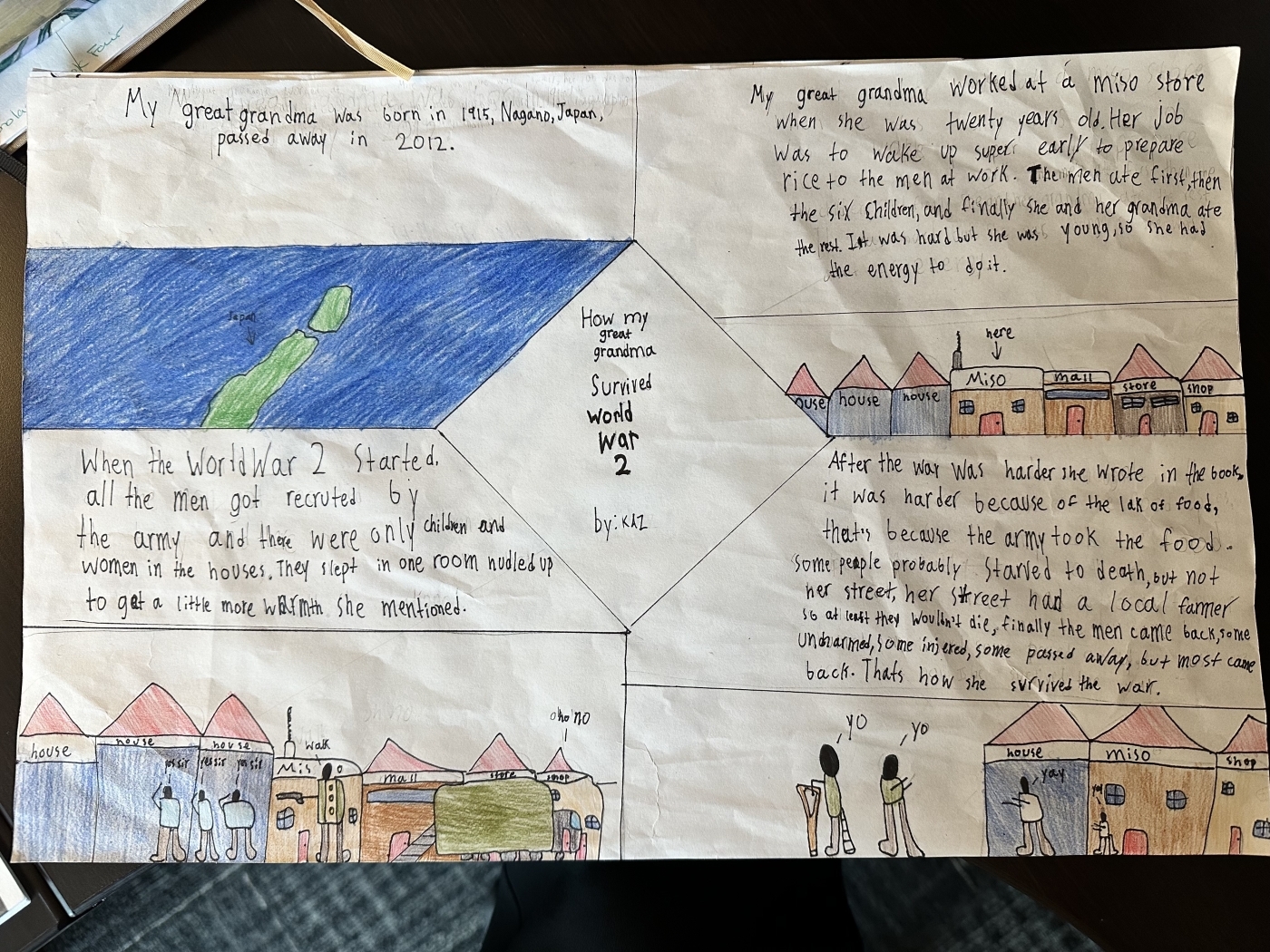 |
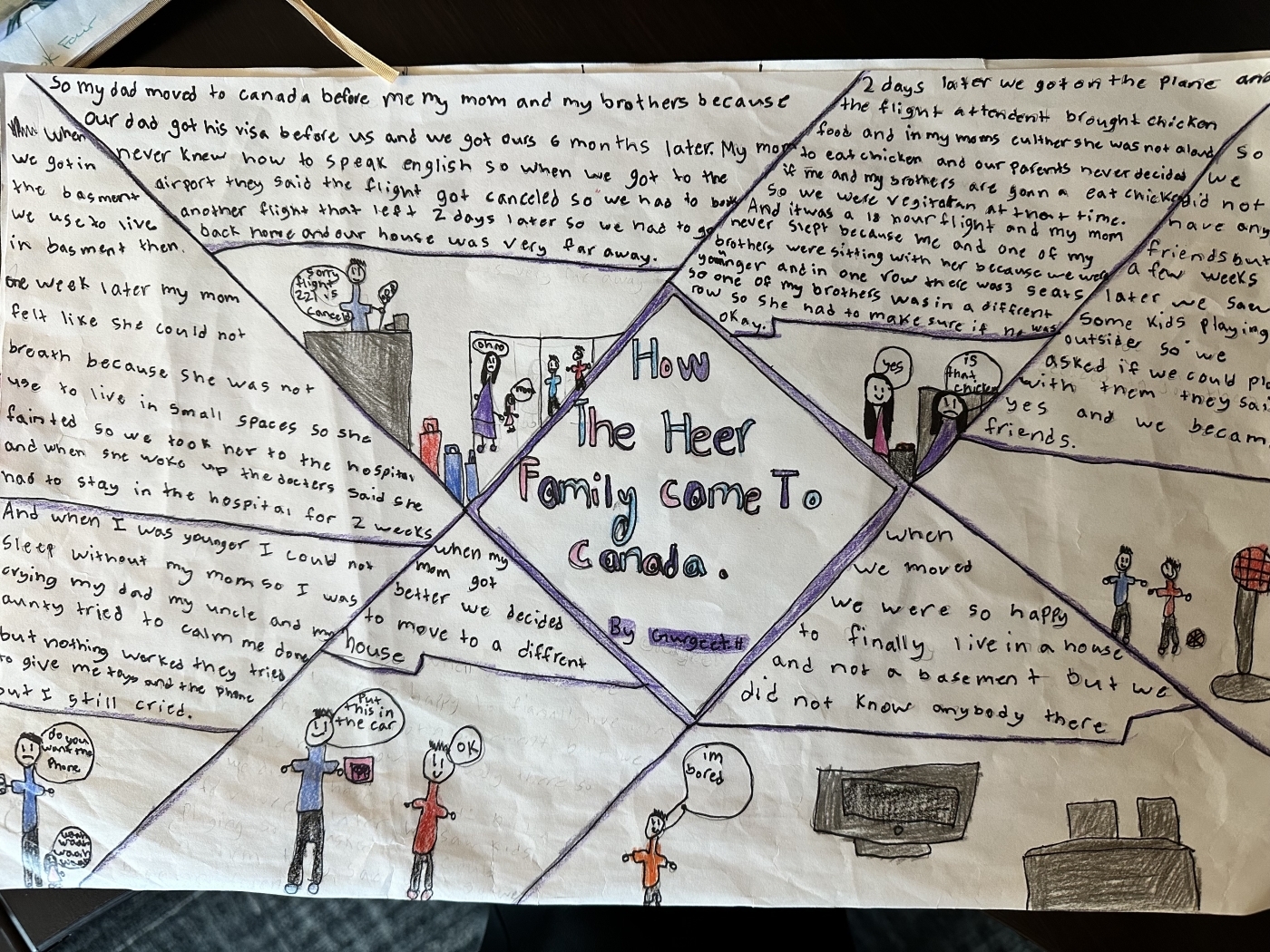 | 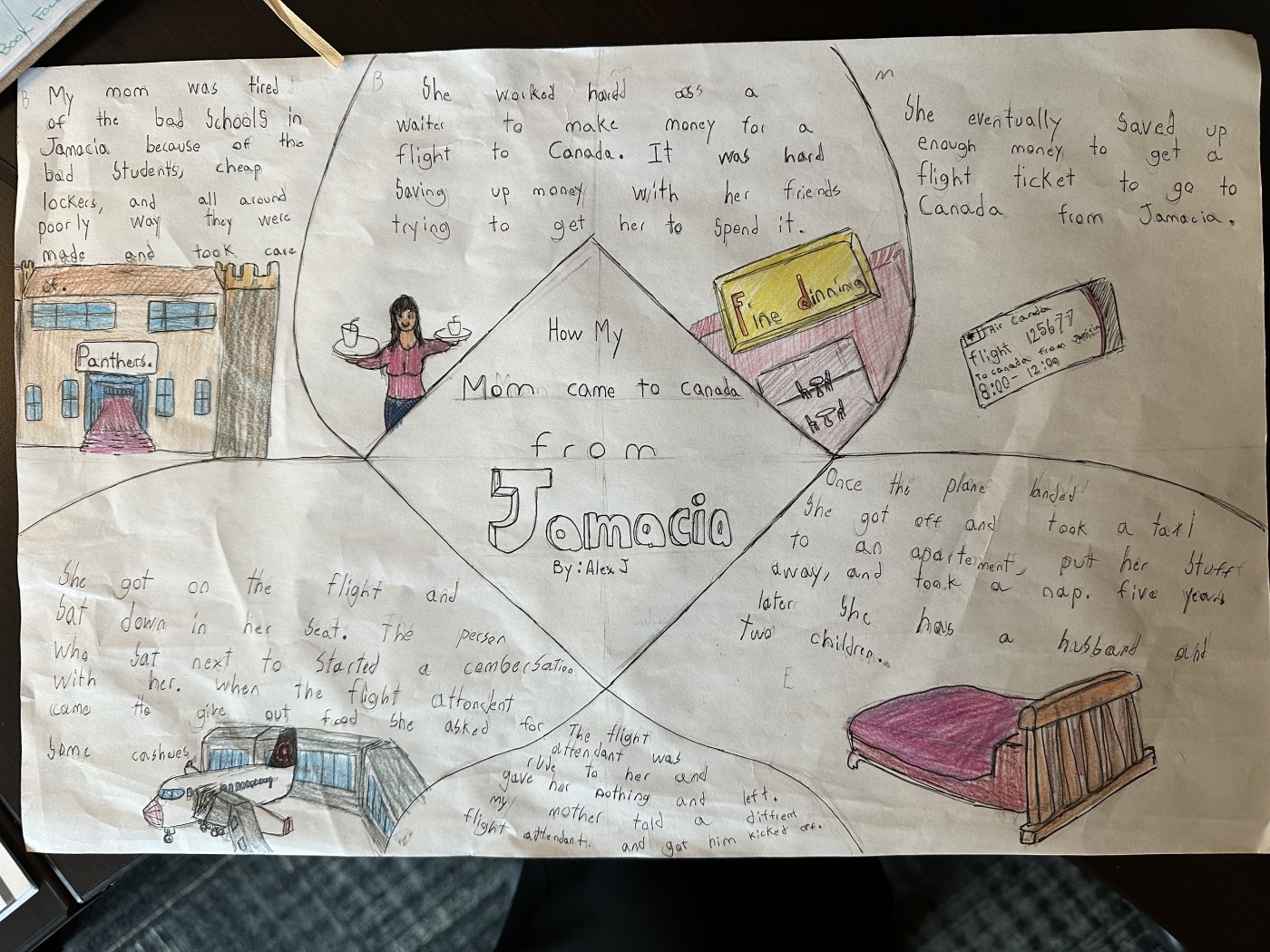 |
Purposeful, Strategic, and Respectful Communication
Students are encouraged to communicate with intention and purpose, understanding that their words have power and that communication can influence, teach, inspire, and heal. They learn to consider audience, message, and impact, drawing on a range of forms and techniques to express themselves meaningfully.
For example, one of our students shared a persuasive piece advocating for the most beautiful place to visit. Her delivery, through voice, gesture, and connection to the audience, demonstrated how effective communication is both expressive and relational.
The Journey to Literacy is Lifelong and Individual
Early literacy at our school begins with oral language and is grounded in play, exploration, and sensory engagement. Students develop foundational skills in spelling, grammar, and sentence structure, while also learning to respect different learning styles and timelines. In our primary classrooms, students participate in multisensory phonemic awareness lessons that support them in identifying, blending, and segmenting sounds—laying the groundwork for strong reading and writing skills.
We honour each student’s learning journey. We believe that literacy development is a process. It is one that requires time, patience, reflection, and care. Through our inclusive and culturally responsive practices, we aim to ensure that every learner feels seen, heard, and supported as they grow into capable and confident communicators.
OUR FOCUS
OUR FOCUS: Building Literacy Through Identity, Connection, and Communication
At our school, we are committed to fostering strong literacy foundations through a variety of meaningful learning experiences that focus on thinking, writing, and communicating across all areas of the curriculum. Literacy learning is approached holistically, honouring the First Peoples Principles of Learning by recognizing that learning is reflexive, experiential, and grounded in relationship with self, family, community, and the land.
Our students' learning goals include:
- Creating text to deepen awareness of self, family, and community
- Identifying, organizing, and presenting ideas in a variety of forms
- Communicating using letters and words, while applying Canadian conventions of spelling, grammar, and punctuation
To plan for intentional, responsive learning experiences, we monitor the progress of student cohorts across different subject areas. One such cohort, composed of Grade One and Grade Two learners, provides a meaningful sample of student learning. These cohorts are carefully chosen as representative indicators of broader school performance and growth.
Formal writing assessments are conducted in September, December, and March to inform instructional planning and monitor student development over time. Writing is also evaluated at the end of the school year in June.
In our Grade One and Two classrooms, students create texts to explore and express personal identity, cultural background, and connections to family and community. This writing process is supported by structured phonics programs and a clear scope and sequence for early literacy development. Students engage in activities such as 'Brain Pocket' writing, which encourage playful experimentation with language and deepen their understanding of how words work. As sound detectives, they develop critical decoding and encoding skills that support their growth as spellers, readers, and writers.
Through these learning opportunities, students come to understand that literacy is not only a tool for communication, but also a means of making meaning, preserving story, and affirming identity within a community of learners.
OUR NEXT STEPS
In Grades 1 and 2, students learn to generate and organize ideas from personal experiences, interests, and questions. They practice writing with a clear beginning, middle, and end, and begin to express their voice through thoughts and feelings. With support, they apply phonics and spelling patterns to write more accurately and are introduced to the writing process—planning, drafting, revising, and reflecting.
Writing was formally assessed through class-wide writes in September, November/December, March, and June. Topics included My Best Day Ever, My Best Gift Ever, Being a Good Friend, and A Perfect Birthday Party. September writing served as a baseline to track growth and guide instruction. Results showed a need for daily writing routines and a structured, explicit approach to phonics.
Below are examples of students’ writing:
September 2024 - Student A (Grade 1) : My best day ever:
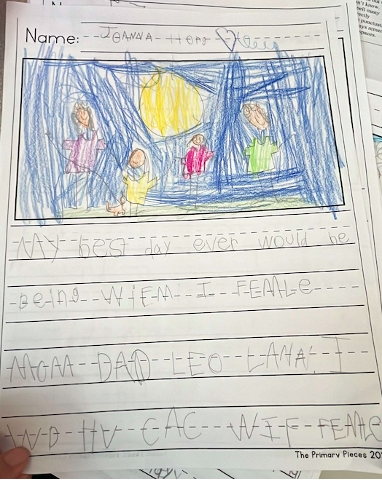
December 2024 - Student A: The best gift ever
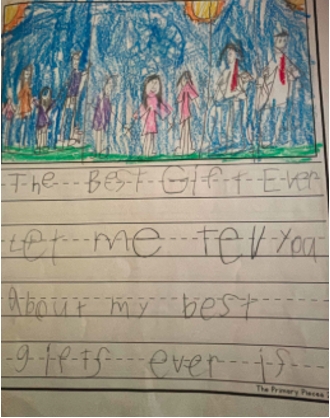 | 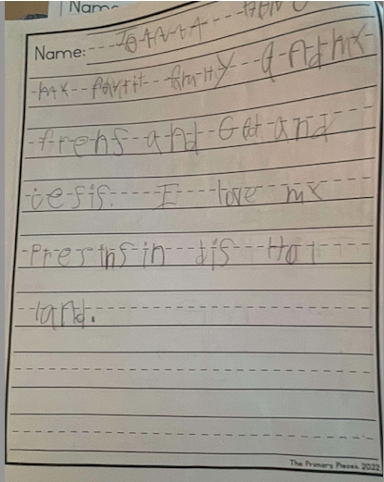 |
February 2025 - Student A - I can be a good friend.
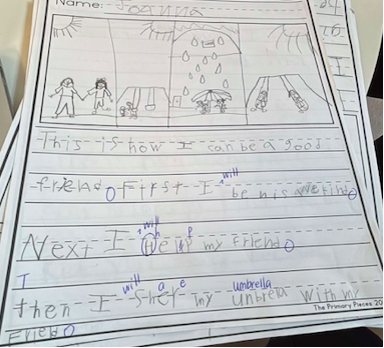 | 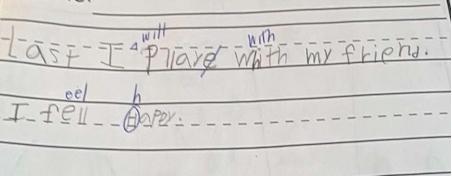 |
June 2025 - Student A - My perfect birthday party
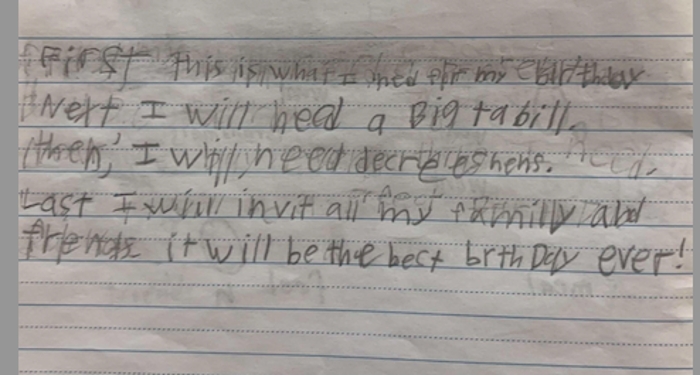
Student A is an English Language Learner. At the beginning of the year, her writing showed that she was attempting to sound out words independently, writing mostly in capital letters with limited spelling accuracy.
By mid-year (December and March), she was assessed as developing. Her writing showed progress in phonetic spelling and more accurate use of uppercase and lowercase letters. Through consistent phonics instruction (UFLI) and daily writing practice, Student A made steady gains in her spelling and writing skills.
By the end of the year, her writing was assessed as proficient. She is now able to independently write about a single idea with supporting details, use complete sentences, and apply correct capitalization and punctuation in most cases.
September 2024 - Student B (Grade 2)
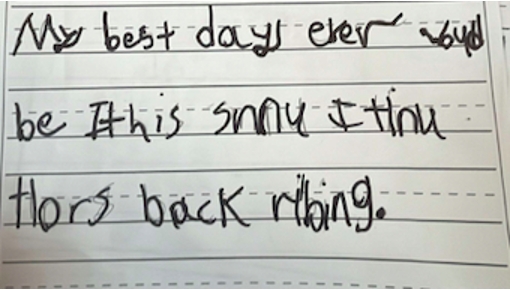 | 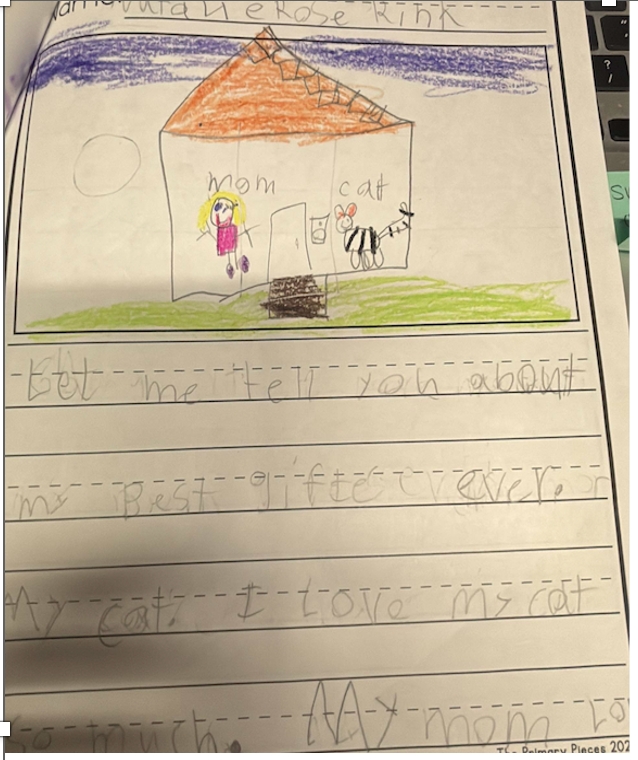 | 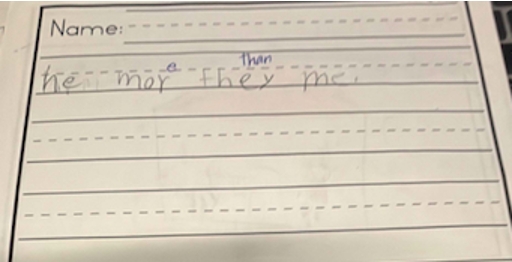 |
March 2025 - Student B (Grade 2)
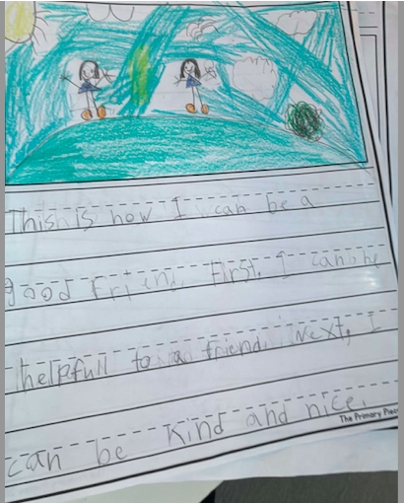 | 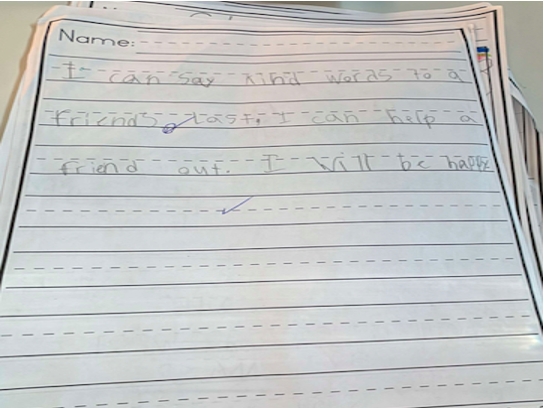 |
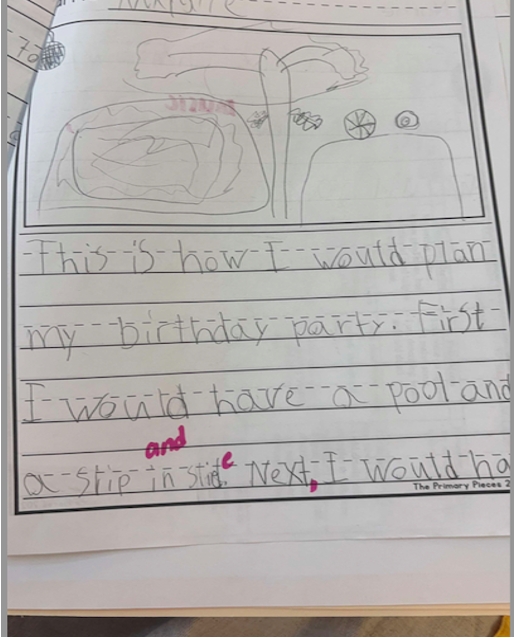 | 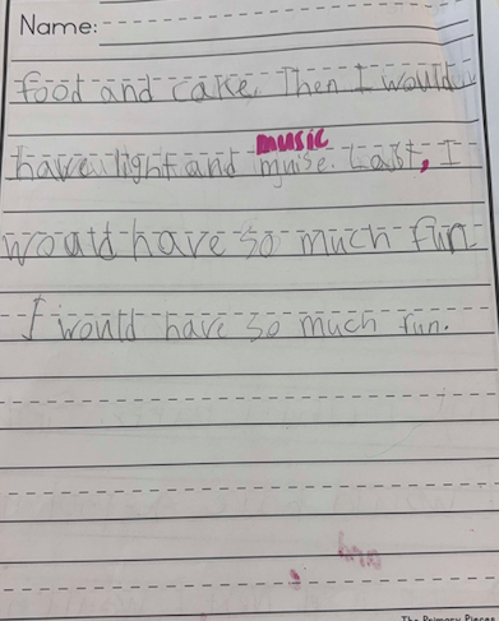 |
Student B’s beginning-of-year writing highlighted gaps in phonics knowledge. She was able to express only one idea and had difficulty expanding her thoughts. By November, her writing was assessed as developing, as she struggled to consistently write complete sentences.
Throughout the year, Student B made steady progress. By March and June, her writing was assessed as proficient. She demonstrated improved phonics skills, greater spelling accuracy, and the ability to write a topic sentence, three supporting ideas, and a concluding sentence. Her end-of-year writing included more detail, showing clear growth supported by daily phonics instruction and consistent writing practice.
September - Student C (Grade 1)
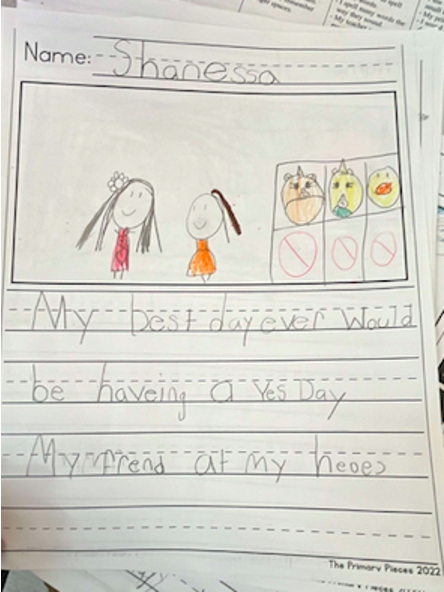
December 2024 (not pictured)
March 2025 - Student C (Grade 1)
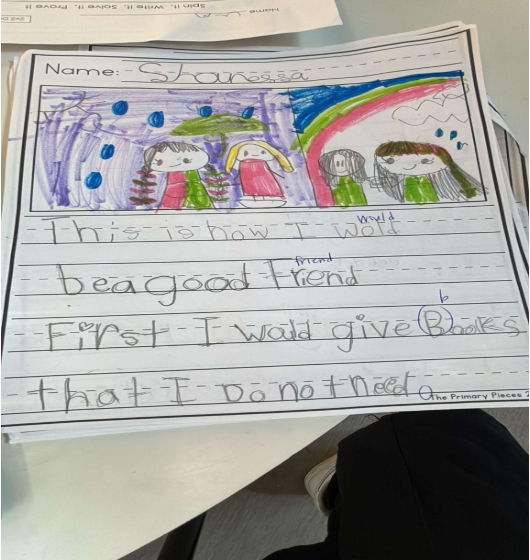 | 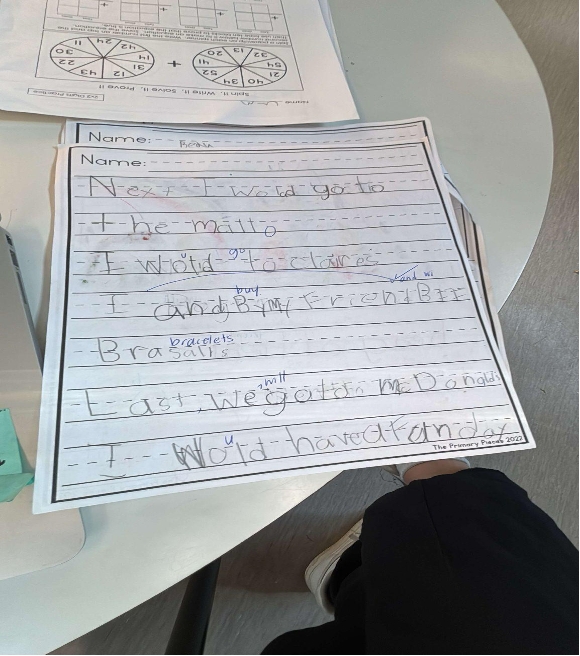 |
Student C was assessed as developing in her beginning-of-year writing. While she was able to spell most words accurately, she expressed only one idea. Over time, her writing showed clear improvement. With daily phonics instruction and writing practice, she became more confident in expressing her ideas. Her sentences were clearer, and her spelling remained accurate.
By March, her writing was assessed as proficient, and by June, she reached an extending level. Her final writing demonstrated her ability to write a complete paragraph, expand on her ideas, and apply spelling and grammar conventions effectively.
Student D - September 2024 (Grade 2)
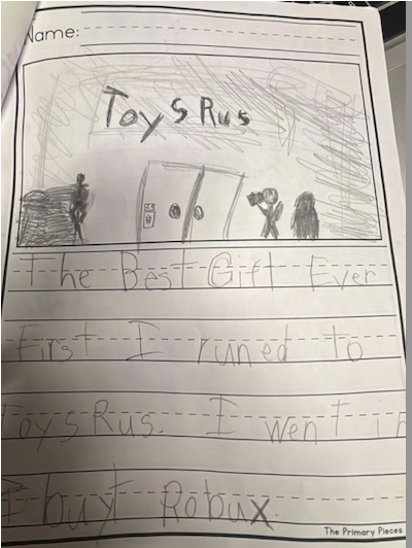
Student D - March 2025 - Grade 2
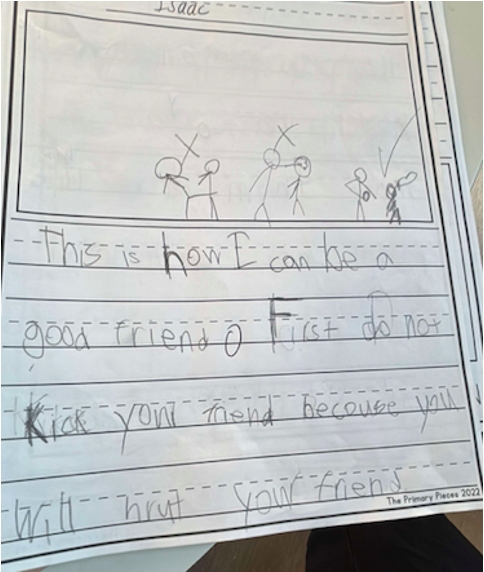 | 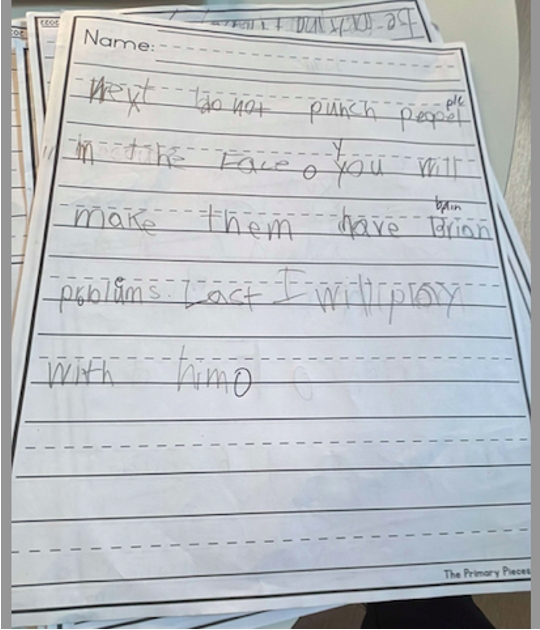 |
Student D - June 2025 (Grade 2)
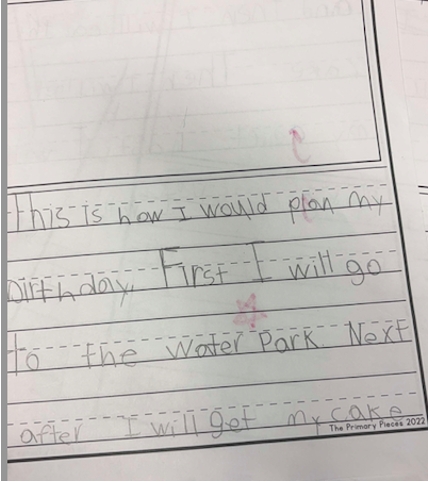 | 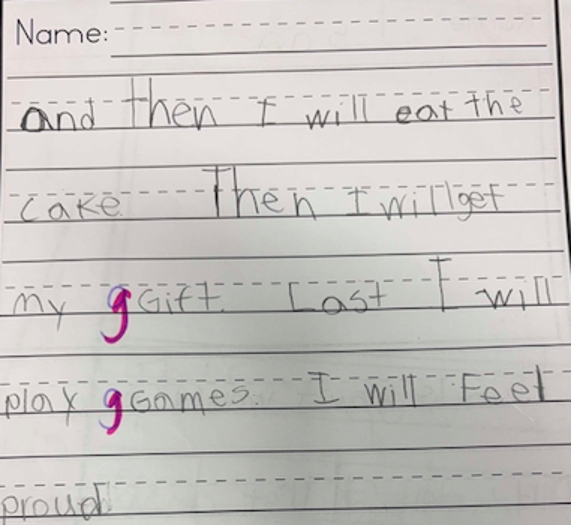 |
Student D’s September writing showed limited ideas and some accurate spelling, indicating a need to strengthen his phonics knowledge. He was able to write complete sentences but often omitted proper punctuation.
In November, his writing was assessed as developing. While the length of his writing had not increased, his spelling reflected his phonics progress to that point. He continued to be assessed as developing through March, as he remained inconsistent with punctuation and lacked a clear concluding sentence. However, his writing stamina improved, and he began producing longer pieces.
By June, Student D’s writing was assessed as proficient. He applied his phonics knowledge more effectively, used more accurate spelling, and demonstrated improved sentence structure and paragraph organization.
Students A-D, as well as the rest of the class, were assessed based on the following rubric.
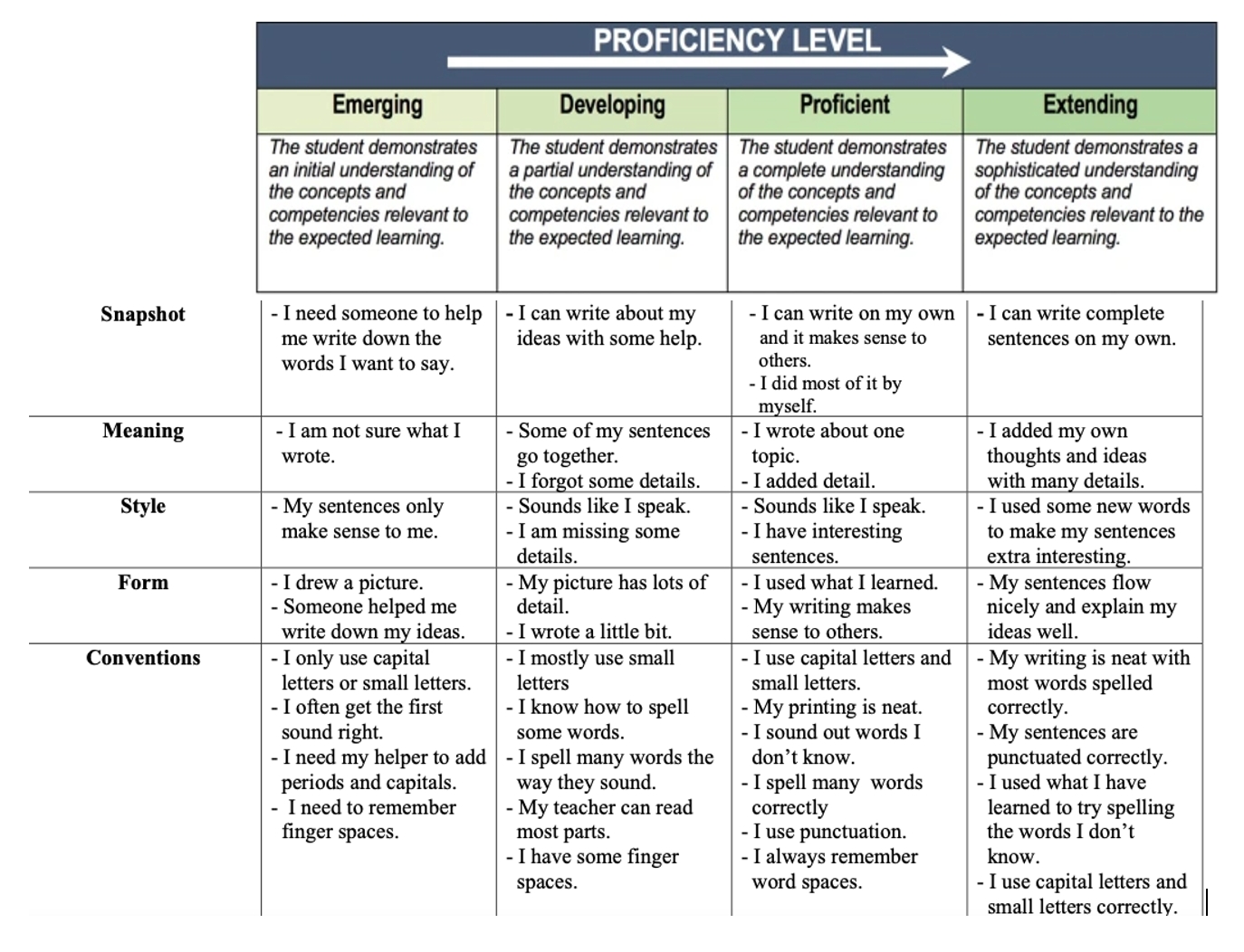
PERSONAL NARRATIVE | Percentage of Emerging Writers | Percentage of Developing Writers | Percentage of Proficient Writers | Percentage of Exceeding Writers |
September 2024 | 5% | 95% | ||
November 2024 | 87% | 23% | ||
March 2025 | 45% | 50% | 5% | |
June 2025 | 18% | 59% | 23% |
The data reflects significant improvement in writing among most students in this Grade 1/2 class. This growth can be attributed to the implementation of a structured, systematic phonics approach. Students engaged in daily UFLI lessons, along with regular grammar and writing instruction. Daily writing opportunities supported the development of their written expression and foundational skills.
Looking ahead, following a clear scope and sequence for grammar and composition will further support student growth. In the upcoming school year, instruction in phonics, grammar, and writing will align with the new learning progressions outlined by the BC Ministry of Education. Our school will take this into consideration as we continue to work toward our writing improvement goal.
